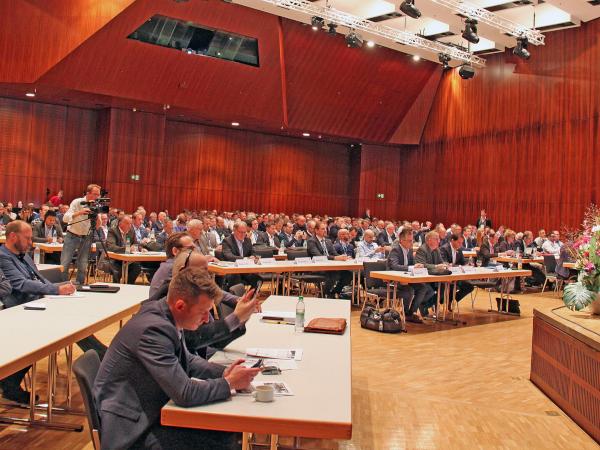
Date: 8 December 2022
The lively conversations during the breaks and at the Bavarian festive evening - the joy of personal exchange was palpable. But the lecture programme also convinced the 522 participants, as the lecture halls were always well filled. The many lectures on climate protection and sustainability illuminated the topic from strategic, economic, regulatory and practical perspectives. All speakers agreed that time is pressing and that an increase of the energy refurbishment rate is necessary and also possible. "Yes, we can do it" was the unanimous tenor and thus did full justice to this year's motto "Entering the new climate era".
Now that the Corona pandemic has lost some of its horror, the 49th Rosenheim Window and Façade conference saw the long-awaited return of the largest expert congress in the window and façade industry. That is why Dr. Jochen Peichl (CEO ift Rosenheim) opened the Fenstertage also in reference to one of the most famous film quotes "We are back". Behind the successful relaunch of the Rosenheim Window and façade conference, however, there were also hundreds of hours of intensive work to develop a top programme with competent speakers and a comprehensive service so that the 522 participants could feel completely happy.
The start of the "entering the new climate era" was made by the director of the institute, Prof. Jörn P. Lass, who in his lecture "Sustainable building - windows, doors and façades as building blocks of the energy and resource turnaround" described very precisely the expected requirements and verifications that manufacturers and suppliers must expect.
Although the data of an environmental product declaration (EPD) are available for a basic level, further characteristic data and assessments are needed for a practically useful evaluation of the sustainability and climate safety of building elements. However, these are only very incompletely covered by the existing standards. For this reason, ift Rosenheim will develop a corresponding evaluation system by BAU 2023, which was considered necessary by 88% of the participants according to the hall survey. With the words "windows and façades are the only building products that can gain energy", he spurred the industry on to optimism and more commitment.
The renowned climate expert Prof. Dr. Stefan Rahmstorf (Potsdam Institute for Climate Impact Research, PIK) argued along the same lines, urgently warning that time is running out to reduce climate change and that CO2 emissions must be drastically reduced by 2030 before tipping points make this extremely difficult. On a positive note, he said that the technology for change is available, as photovoltaic and wind energy are already the cheapest ways to generate electricity - even in Germany. He also dispelled the common misconception that a temperature increase of 1.5 - 2.0°C in Germany and Europe would not be so bad. At 2.0°C, this is already twice as high as the average in Germany and is leading to regular heat waves, increasing drought, fires and forest dieback in Europe. During the last heat wave in 2003, there were about 70,000 heat-related deaths in Europe, and over 100,000 victims are estimated for 2022. Changes in the jet stream also regularly cause localised heavy rain and flooding. Since the world is heading for a temperature increase of about 3.2 °C with current measures, consistent action is required - especially in the building sector, which consumes fossil fuels very disproportionately and can only be changed very slowly because of it´s decentralised energy supply. Prof. Rahmstorf therefore also expects a "turnaround" in the political requirements for energy-efficient renovation of the building stock.
Martin Langen (B+L Markdaten) argued in the same direction, presenting the following key messages based on current analyses and many years of experience:
- The construction industry is no longer cyclical, does not necessarily follow the general economy and is supported by politics as a systemically relevant branch of the national economy, even in crises.
- Policymakers will focus their subsidies on energy-efficient renovation and the construction of new multi-family housing. The single-family house will clearly lose its relevance for subsidies, even if it is the desired goal of most people.
- The (necessary) massive immigration generates relocations, which mostly serve as an occasion for refurbishment and thus also promote energy refurbishment.
- The higher construction costs will only temporarily slow down construction activities and will not lead to a permanent decline.
- As long as higher mortgage rates are well below inflation, they will not lead to a collapse in construction activity, especially in multi-family housing.
- Higher energy costs lead to energy refurbishment.
- The order situation remains positive in the medium term because there is a surplus of approx. 800,000 approved residential units, the majority of which originate in 2020-2022.
Martin Langen sees most of the sharp downturn in the construction industry in the summer of 2022 as a temporary phenomenon, because he believes the cause to be the greatly reduced capacities due to corona-related sick leave and quarantine as well as the wave of holidays (company closures).
In the fourth plenary lecture, Prof. Christian Niemöller gave very detailed instructions on how window and façade manufacturers in particular can report the current delivery difficulties of materials and construction elements as an impediment if these can be attributed to the war in Ukraine as "unavoidable circumstances". The VOB/B offers clear advantages here compared to a BGB construction contract, because §6 of VOB/B contains rules on how the effects of "unavoidable circumstances" can be asserted in terms of deadlines, remuneration and performance even before final acceptance. In a BGB contract, on the other hand, the contractor bears the full risk until acceptance.
On Thursday, Thomas Drinkuth (Representative Office Transparent Building Envelope) and Frank Lange (Window + Facade Association) reported on the latest developments regarding the government's possible regulatory and promotional policy measures. Even though everything is still in flux, some key points are clearly recognisable. The current energy crisis has made it clear to most politicians that, in addition to promoting renewable energies, it is imperative to improve energy efficiency. The prime example is the heat pump, because it has become clear that it is only energy-efficient in a well-insulated building. For this reason, both speakers expect significant subsidies for energy-efficient refurbishment and even spoke of a "refurbishment booster". It is also to be expected that in the next amendment of the Building Energy Act (GEG), solar gains of glass will be credited and the requirements for the U-value of the building envelope will be relativised. This was also explained in detail by Dr.-Ing. Stephan Schlitzberger (IB Hauser GmbH) in his presentation. Also interesting was the insight into the mechanics of government and the motivation of politicians who not only want to solve problems, but always have the voters and the next election in mind. Also mentioned was the pressure from Europe in the form of the "Minimised Energy Performance Standards (MEPS), which calls for a climate-neutral building stock by 2030. Both speakers concluded by appealing to the industry "We have to step on the gas now so that the energy transition succeeds".
The other presentations complemented the plenary presentations with important details. These included information on the
- current status of recycling possibilities (and Walter Lonsinger (A|U|F e.V.), Jochen Grönegräs (Bundesverband Flachglas e.V.) and Gerald Feigenbutz (QKE e.V.),
- current status and outlook on the revision of the Building Energy Act (GEG) by Dr.-Ing. Stephan Schlitzberger (IB Hauser) with the expected requirements for glass, windows and façades,
- Update on the state of the art of the difficult interface of structural waterproofing by Wolfgang Jehl (ift Rosenheim),
- on the thermal refurbishment of box-type windows with vacuum insulating glass (VIG) Dr. techn. Ulrich Pont (TU Vienna),
- on the innovative use of vacuum glass and other creative ideas in the student project "Solar Decathlon" by Prof. Dr. Jochen Stopper (TH Rosenheim) and
- Practical and strategic advice on the development of windows and façades with regard to sustainability and digitalisation from Prof. Dr.-Ing. Winfried Heusler (Ostwestfalen-Lippe University of Applied Sciences, Schüco International) and
- Solutions for the very difficult reconciliation of climate protection and monument conservation using the example of the new National Gallery by Jürgen Einck (Drees & Sommer).
The main topic "climate protection" was supplemented by presentations on Brexit and the British conformity mark "UKCA" (Roland Fischer, ift Rosenheim), on the durability of antimicrobial surfaces (Norbert Sack, ift Rosenheim and Christian Scherer (Fraunhofer Institute for Building Physics, IBP) and on the professional fastening and verification of fall-proof building elements (Prof. Dr. Benno Eierle, TH Rosenheim),
The power workshop on Tuesday afternoon was also well attended with almost 100 participants, as it provided valuable tips on "Simplifying window installation with cost and time savings through digital helpers" (Marc Schütt, ö.b.u.v. Expert in the carpentry trade), the "Installation of fall-proof elements" (Martin Heßler, ift Rosenheim), a practical report on "Energy-efficient renovation with windows from the point of view of an energy consultant" (Dieter Tausch, Ingenieurbüro für Gebäudeenergie und Fenstertechnik) and practical tips for the correct planning, order preparation and installation of profile extensions (Ingo Leuschner, ift Rosenheim).
One of the highlights was once again the Bavarian evening with "Oktoberfest flair" and the excellent party with a circus atmosphere and a live band that motivated people to dance and sing along with popular rock and pop songs.
On Thursday afternoon, more than 50 window and façade experts visited the excellent testing facilities of the new ift Building Acoustics and Façades Laboratories and the Fire Test Centre.
The ift management trio, consisting of Dr. Jochen Peichl (CEO), Michael Breckl-Stock (CTO) and Prof. Jörn Peter Lass (Institute Director), was therefore also delighted with the very positive feedback from the participants and are now looking forward to seeing them again at the 50th Window and Façade conference on 11 + 12 October 2023.
 600450
600450


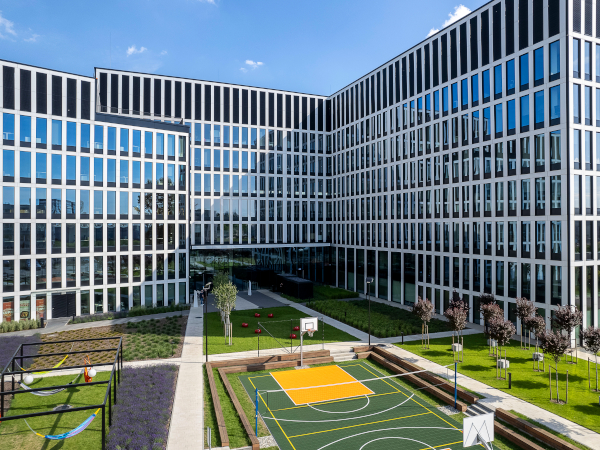



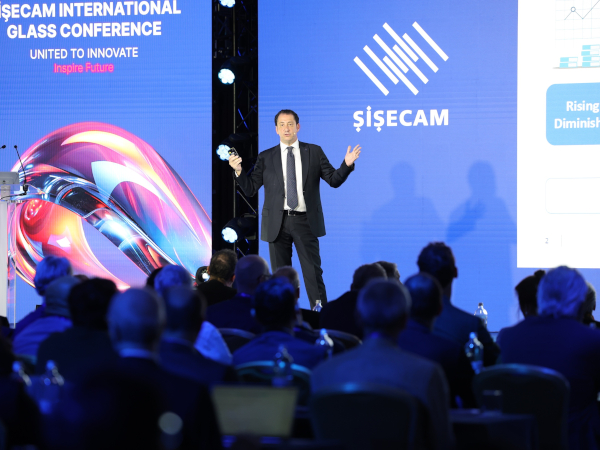







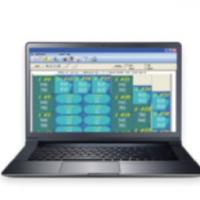

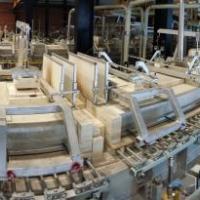



Add new comment